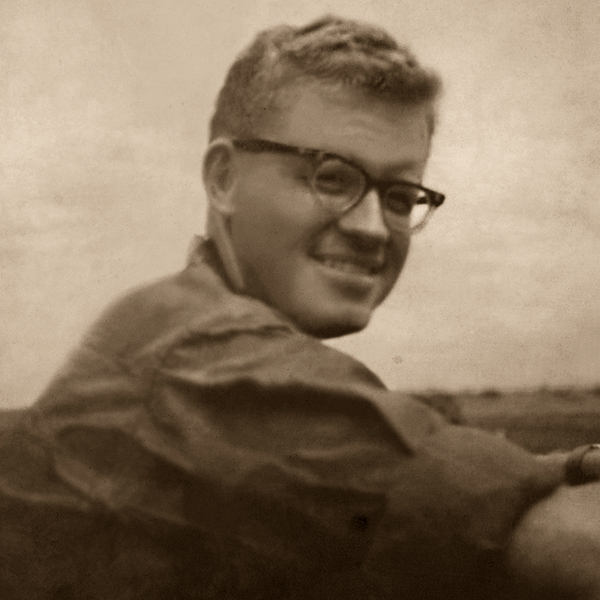
Merle Sharpe
Windber, Pennsylvania - United States Army
Written by William Sharpe
My twin brother, First Lieutenant Merle James Sharpe, was a 1966 ROTC graduate of Penn State and a recipient of the Distinguished Service Cross for heroism in the May 1968 battle to reclaim parts of Saigon from the Viet Cong. His exploits during this battle, in which he was seriously wounded, are highlighted in Keith Nolan's book entitled House to House Playing the Enemy's Game in Saigon, May 1968 and in the Philadelphia Inquirer article below. My brother also received a Silver Star for his actions in an earlier skirmish with the Viet Cong.
Pennsylvania Officer Shot in Battle, Fights 5 Hours
By Paul F. Levy - Philadelphia Inquirer - May 8, 1968
Alpha Company, with 58 men and nine armored personnel carriers, moved slowly down the quiet street on the outskirts of Saigon. "We know the Viet Cong are in there," 1st Lt. Merle Sharpe, 22, of Pittsburgh, explained as he moved alongside the lead vehicle. "The question is where?" Forty seconds later, Alpha Company found out. The Viet Cong, well-fortified in a factory and a dozen buildings at the end of the street, opened up with B-40 rocket grenades.
Sharpe is Hit
Fragments from the first round caught Sharpe in the chest, dropping him to the ground. A B-40 rocket, capable of punching 11-inches of steel, stopped an armored vehicle in its tracks in the middle of the street. Several more men from Alpha Company were wounded as the street developed into a fierce battleground. Such scenes around Saigon have been common since the Viet Cong offensive began during the weekend.
Sharp, a little guy with red hair and glasses who recently graduated from Pennsylvania State University and hopes to go back soon for a master's degree in English, pulled himself into the shadow of the lead vehicle and began directing the attack. Blood stained his flak jacket.
He Refuses to Leave
For five hours yesterday, while the battle ebbed and flowed along the unnamed street in a shantytown less than a mile south of Saigon. Sharpe refused to be evacuated. Finally, pulling himself inside the armored vehicle, Sharpe ordered the eight personnel carriers that hadn’t been hit to pull back to the end of the street.
Once outside the range of fire, he pulled himself to the top of the carrier, plotted map coordinates and called for air strikes and artillery fire on the Viet Cong position. Alpha Company wounded, including the two platoon leaders, who were second in command to Sharpe, were evacuated. But Sharpe still refused to go.
Air Strikes and Artillery
Propping himself up against a hatch cover on the armored vehicle, he calmly directed the air strikes; First the helicopter gunships with their guns that fire 6,000 rounds a minute, and finally the artillery. Then the company moved back down the street, cleaning out the Viet Cong from each house along the way. Now there was only scattered enemy fire. After five hours, the battle was over. And Sharpe finally agreed to go to a hospital.
Silver Star Ceremony
Tomorrow, in a bedside ceremony at a hospital near Tan San Nhut Air Base, he will be given the Silver Star - the nation’s third highest tribute. "But it is only an interim medal," Col. Eric Antila, of Santa Fe, New Mexico, explained. "I'm putting him in for the Distinguished Service Cross." This is the second highest award. The highest is the Medal of Honor. "If anyone deserves it, he does." Antila said.
Yesterday, as Alpha Company, an armored unit attached to the 9th Infantry Division rested in an open field less than a mile from the battle scene, Sharpe was the only topic of conversation. "When you listened to him over the radio," Antila recalled, "I didn’t even believe he was wounded. But that was typical."
Penn State Training
A quiet, thoughtful soldier, Sharpe had taken reserve officer's training at Penn State, then shipped out for Vietnam shortly after graduation. For the past six months, he has been commander of Alpha Company. "But he wanted to know more about the war than that," Col. Antila said.
"He was due to be relieved as C.O. [commanding officer] after six months in the field and I asked him what he wanted to be. He said he’d like to be S-5 [the civil affairs officer who works with the local people and pacification program]. It's a job we can’t normally give away. He said he knew enough about the fighting side of war, and now he wanted to know the other side." The "other side," however, would have to wait a few days.